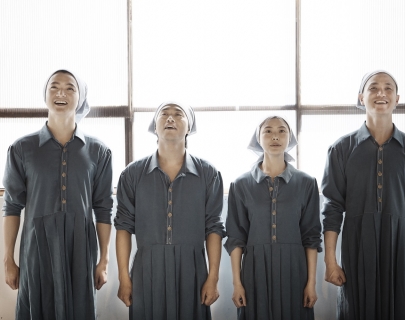An accomplished social commentary: Factory Girls review
‘PULL, REEL, SPIN’. The words linger on the mind, morphing into a monotonous thrumming. Such is the way of life for the characters in Factory Girls, stuck in a cyclical routine that demands unconditional obedience. An accomplished social commentary on the capitalist structures that still exist today, director Jihye Park triumphs in presenting this subject matter through the play’s minimalist yet palpable stagecraft.
Oksun is an 18-year old girl from a working-class background, working tirelessly in an oppressive textile factory run by a dictatorial factory director, Tanaka. She is subject to persistent torment at the hands of Tanaka, more so than any of the other workers. The plays’ depiction of the worker-boss relationship acts as a microcosmic example of how industrial capitalism informs the power dynamics between human beings. The workers are treated as pieces of equipment, embodied in the way the actors mimic the sounds of the machinery to fill the bare stage, becoming machine-like themselves. The ideas of the denigration of human beings within a capitalist structure are presented with such nuance and great efficacy, especially amidst the setting of Korea under Japanese occupation in the 1930s. The play excels in the seamless interweaving of its historical setting with the themes presented through the characters’ physicality.
The workers are treated as pieces of equipment, embodied in the way the actors mimic the sounds of the machinery to fill the bare stage, becoming machine-like themselves
Naturally, talk of strikes begins to dominate conversations between workers, as they convene in private. Yet, there is always this foreboding sense of despair when they do so. Their revolutionary cries are constantly interjected by company orders and instructions. Park adeptly introduces the absolute hopelessness of their endeavours by again showing their utter adherence to instructions given by their superiors. From the offset, despair seems to be riddled throughout the story, as the characters are doomed to fail in this capitalist system. Routine has plagued the lives of these workers, as they continue their jobs unquestioningly in an unforgiving environment.
Minimalism is at the core of the play’s aesthetic. It is reflective of the emptiness both within the workers, and also the capitalist structure as a whole. Four orange fluorescent bulbs hang over the stage, effusing an ominous glow that heightens the isolation felt on stage. But the play offers moments of levity and hopefulness in an otherwise dark story. Certain characters deliver lines of comic relief that help to lighten the mood. Towards the end of the show, there is a moment in which Oksun steps directly underneath the lights, changing the hue of her clothes from a dreary grey to a lighter blue. It is a rare moment of optimism that sheds a whole different light on the play. Seeing her individuality come forth in the form of more colourful clothing reminds us of how personal identities are removed within the collective workforce. This is one of the many ways the play takes great care in stressing the importance of individuality, and how this is eroded in a factory-like environment.
A tale of exploitation, poverty, and capitalism, the play guides the audience in a way that is both inviting, yet so intense it is difficult to watch at times
The four actors seamlessly transition between multiple characters from scene-to-scene by changing how they use their bodies. It is the way in which the actors move that drives the play forward with great intensity. With its minimalist set design, the cast use their bodies to full effect. The stage is, essentially, their canvas, and they breathe life into the mundanities of factory life. Their exaggerated movements, resonant voices, and flawless choreography combine to create a genuinely moving piece of theatre.
While the entire cast is fundamental to constructing the atmosphere of the play, it must be said that the play is at its most immersive during the harrowing scenes between Oksun and Tanaka. His movements are nothing short of predatory. The staging adds further danger to her plight; there is literally nowhere to run or hide, as Oksun is exposed both physically and emotionally to Tanaka’s harassment.
Factory Girls is an important story tell. A tale of exploitation, poverty, and capitalism, the play guides the audience in a way that is both inviting, yet so intense it is difficult to watch at times. That being said, the play serves as both a tremendous artistic exercise, and a reminder to people that exploitation of labour is still very much an issue in more remote parts of the world.

Comments